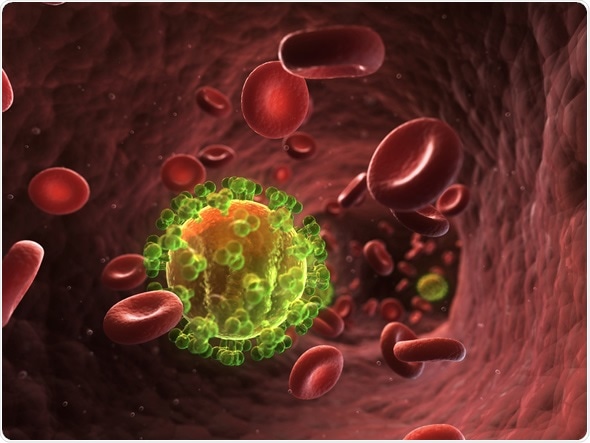The HIV virus infects and destroys CD4 positive (CD4+) cells, a type of immune cell that plays a key role in maintaining the human immune system and fighting off disease.

3d rendered illustration - HIV - Image Copyright: Sebastian Kaulitzki / Shutterstock
Also called T-helper cells, CD4+ cells are responsible for instructing other cells of the immune system to perform their specific functions. At the time of infection with HIV, the higher the number of CD4+ cells that become damaged, the weaker the immune system becomes and the less able a person is to fight off infection and disease. Eventually, this results in the development of AIDS.
Most HIV infected individuals can carry the virus for years before any serious symptoms develop. If their condition is diagnosed, antiretroviral medications can help lower the HIV levels in the body and preserve CD4+ cells, thereby significantly slowing down the rate at which the immune system is destroyed.
Theoretically, with the use of this type of medication, someone infected with HIV can live for a long time before developing AIDS. However, these medicines are not available in many poor countries with limited resources and millions of individuals from these areas die as a result of not having access to these drugs.
HIV life cycle: How HIV infects a cell and replicates itself using reverse transcriptase
Epidemiological studies in Western countries have shown that, in the absence of antiretroviral medication, the average time it takes for an HIV infection to progress to AIDS is 10 to 12 years. However, this estimate is based on an assumed healthy diet and lifestyle, and again, may not apply to individuals from economically backward areas who may be malnourished and therefore at risk of dying from AIDS much more rapidly.
Furthermore, researchers have observed a wide variation in disease progression among untreated individuals and factors such as the level of virulence of a particular HIV strain and co-infection with other germs are thought to influence the rate and severity of disease progression.
Among people who are not infected with HIV and who are generally healthy, the CD4 count is approximately 800 to 1,200 CD4+ cells per mm3 of blood. Among infected individuals who do not receive treatment, the CD4 count gradually declines.
Once it falls below 200, these people are particularly prone to developing opportunistic infections and cancers characteristic of AIDS, which represents the end stage of the disease. People are therefore generally defined as having progressed to AIDS when the CD4 count falls to below 200 or when they develop one of a number of AIDS-defining complications. However, the point at which a person is defined as having AIDS varies slightly between countries.
AIDS is a very serious condition and people who have reached this stage of disease typically suffer from infections that affect the eyes, lungs, gastrointestinal tract, and many other organs.
Other complications of the disease include severe weight loss, diarrhea, neurological disease and the development of cancers such as Kaposi’s sarcoma and some forms of lymphoma.
Further Reading
Last Updated: Dec 30, 2022